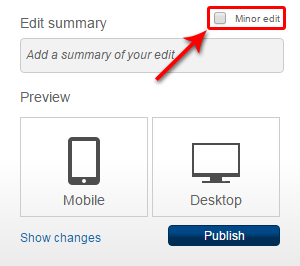No edit summary |
(Fixing words) |
||
| Line 4: | Line 4: | ||
By contrast, a 'major' edit is a version that should be reviewed by other editors to ensure that everyone agrees on the change. Therefore, any change that affects the ''meaning'' of an article is not minor, even if the edit is a single word. |
By contrast, a 'major' edit is a version that should be reviewed by other editors to ensure that everyone agrees on the change. Therefore, any change that affects the ''meaning'' of an article is not minor, even if the edit is a single word. |
||
| − | The distinction between major and minor edits is significant because editors may choose to ignore minor edits when reviewing [[Help:Recent changes|recent changes]]; some users might even set their preferences to not display them. If you think there is any chance that another editor might dispute or discuss your change, do not mark it as minor |
+ | The distinction between major and minor edits is significant because editors may choose to ignore minor edits when reviewing [[Help:Recent changes|recent changes]]; some users might even set their preferences to not display them. If you think there is any chance that another editor might dispute or discuss your change, do not mark it as minor. |
An edit marked as minor is signified with a bolded "m" character ('''m''') in the [[Help:Page history|page history]]. Minor edits will also appear with the same bolded "m" in [[:Special:RecentChanges]]. |
An edit marked as minor is signified with a bolded "m" character ('''m''') in the [[Help:Page history|page history]]. Minor edits will also appear with the same bolded "m" in [[:Special:RecentChanges]]. |
||
Revision as of 07:31, 4 January 2018

In the editor, you can mark an edit as minor by checking the minor edit box in the edit summary field
A check to the minor edit box is intended to signify that only superficial differences exist between the current and previous version: typo fixes, formatting, or otherwise rearranging text without changing content. A minor edit is a version that the editor believes requires no review and could never be the subject of a dispute.
By contrast, a 'major' edit is a version that should be reviewed by other editors to ensure that everyone agrees on the change. Therefore, any change that affects the meaning of an article is not minor, even if the edit is a single word.
The distinction between major and minor edits is significant because editors may choose to ignore minor edits when reviewing recent changes; some users might even set their preferences to not display them. If you think there is any chance that another editor might dispute or discuss your change, do not mark it as minor.
An edit marked as minor is signified with a bolded "m" character (m) in the page history. Minor edits will also appear with the same bolded "m" in Special:RecentChanges.
When should I mark an edit as minor?
- Spelling corrections
- Simple formatting or grammar correction (capitalization, et cetera)
- Formatting that doesn't change the meaning of the page (e.g. bolding text, splitting one paragraph into two)
- Obvious factual errors (e.g. changing The Beatles' 1866 album to The Beatles' 1966 album)
- Fixing layout errors (e.g. changing {template name here} to {{template name here}}
- Adding and correcting wiki links or categories (e.g changing [[Esample]] to [[Example]])
- Removing vandalism and graffiti
Things to remember
- Any change to the source text (wikitext), even if it does not affect the presentation of the page in HTML (if it involves adding a space or a line break, for example) will still be treated as a change according to the database.
- Marking a major change as a minor one is considered poor etiquette, especially if the change involves the deletion of some text.
- Reverting a page is not likely to be considered minor under most circumstances. When the status of a page is disputed, and particularly if an edit war is brewing, then it is better not to mark any edit as minor. Reverting blatant vandalism is an exception to this rule.
Who can mark an edit as minor?
Users who are not logged into FANDOM are not permitted to mark changes as minor because of the potential for vandalism. The ability to mark changes as minor is another reason to register.
An administrator or a user with rollback rights can semi-automatically revert the edits of the last editor of a page; all such "rollback" reversions are marked as minor by the software. This is because the cumulative effect of the edits and the rollback is zero changes. The intended use of the rollback feature is for cases of vandalism, where the act of reverting any vandalism should be considered minor (and can be ignored in the recent changes list).
See also
Further help and feedback
- Browse and search other help pages at Help:Contents
- Check Fandom Community Central for sources of further help and support
- Check Contacting Fandom for how to report any errors or unclear steps in this article
